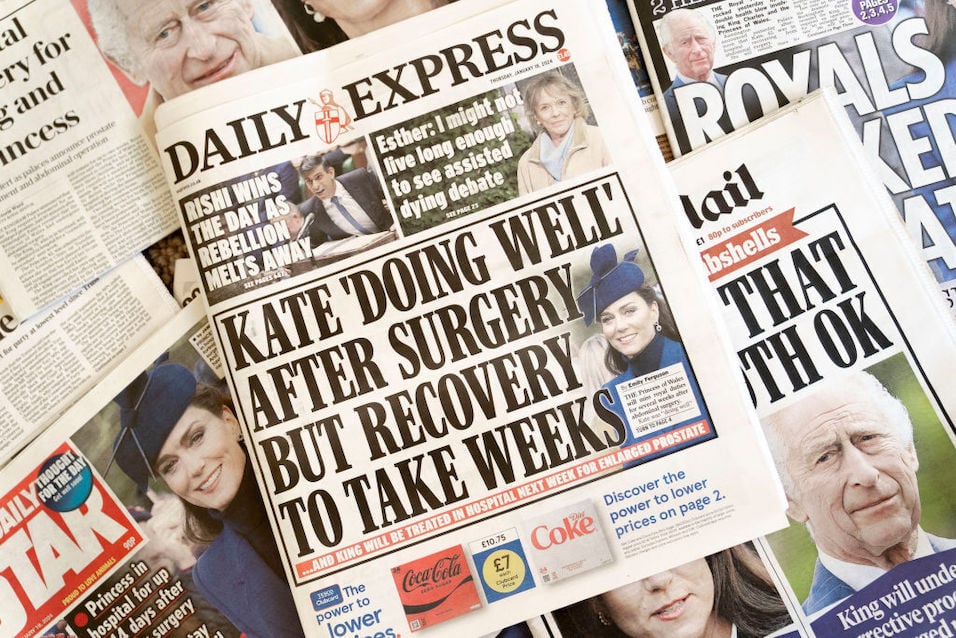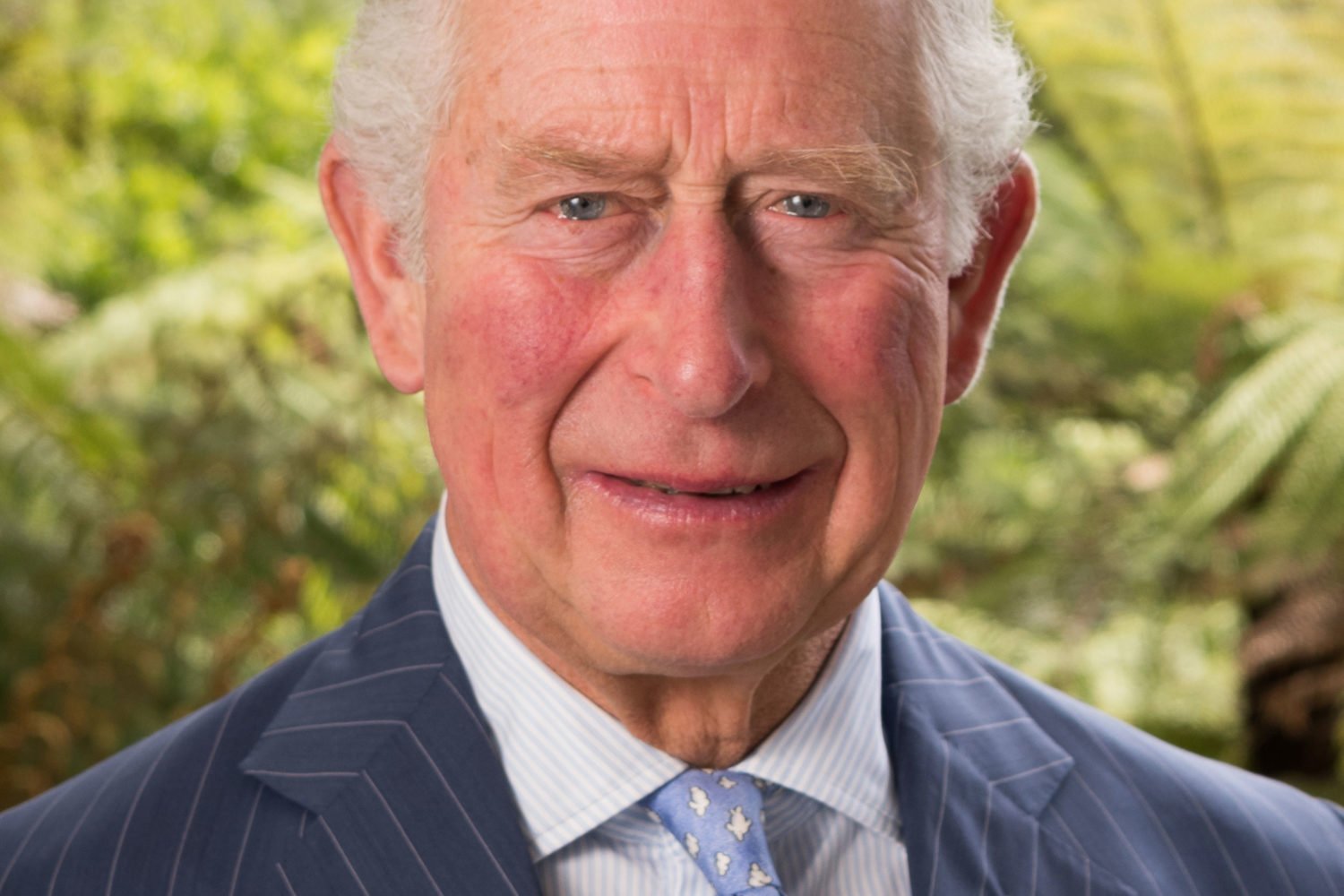The other day, my son came home from school and informed me that Kate Middleton is dead. She is not dead, I insisted—though actually, I didn’t know. I explained to him that in January, the Princess of Wales had some kind of medical crisis then mysteriously vanished from the public eye, fueling rumors that she was deceased, comatose, or hiding an impending divorce. That all seemed like nonsense until last week’s truly bizarre debacle: Kensington Palace released a photograph of the princess with her darling children (proof of life!) which immediately fell apart when people noticed how mangled the Photoshopping was. The truth was, I had no idea anymore whether Kate was dead or alive, and this unsettled me.
For answers, I called Ellie Hall, a DC-based freelance reporter who spent a decade covering the royal family for BuzzFeed News. In recent weeks, she’s become a go-to source on Kensington Palace intrigue—particularly after her timeline of “missing Kate” events went viral. Hall is extraordinarily busy with royal analysis right now. When we spoke, she’d just finished recording an Australian podcast, she was about to go on CNN, and she was in the midst of writing a story for New York magazine. While we talked, she walked her dog—a 3-year-old Golden Retriever named Phoebe—in Lincoln Park, near her home in Capitol Hill.
On Monday, video footage surfaced of what appears to be Kate and William shopping at a farmers’ market. If Kate is officially alive, is that the end of the story?
Oh my god, no. I saw a really good tweet yesterday that said, basically, because of the way that Kensington Palace has completely messed up this entire thing, Kate Middleton could walk up to someone and shake their hand and that person would still think it was three kids in a trenchcoat. It took two seconds before people were like, that’s not Kate. People are saying it’s a teenager. People are saying it doesn’t even look like William. Somebody actually reached out to the most famous Kate impersonator and verified that it wasn’t her—that’s great reporting. But there’s such an information void here that nobody trusts the Palace.
What’s causing this mistrust?
I think over the past few years—in part due to The Crown, in part due to Harry and Meghan saying things about the palace press team and the British media—people have started distrusting the institution of the royal family and the reporters covering the royal family. If you don’t trust the Palace or royal reporters, what you’re going to do is go off of what you can see. And everything Kensington Palace has been doing—they’ve been making very strange decisions. This chaos is just going to keep simmering because Kensington Palace didn’t do anything for far too long, and the misinformation just took over.
How should they have handled this?
We can see by looking at how Buckingham Palace has been handling the King’s medical crisis that if you take certain steps in the beginning, you can make sure that people buy your story. The King was photographed coming out of the hospital when he had his prostate checked out. We saw the Queen going to visit him four times, when Prince William was only photographed visiting Kate once. We’ve had two personal statements from the King, first thanking the public for their support when he was in hospital, then thanking the public for their support when his cancer diagnosis was made public. There were videos of him reading cards posted on social media. There are so many small things that Kensington Palace could have done to shut down speculation, or at least kept it from getting to a fever pitch.
But the royal family’s playbook for so long has been, you know, rumors and gossip will go away if you ignore them. And we’re really seeing here that in a digital age, “never complain, never explain” doesn’t work. If you want to control the narrative, you need to be active in the beginning—and if you don’t, the big empty gap that’s left there will pull in conspiracy theories from the past. There’s been more discussion online about, did the royal family kill Princess Diana? Did Prince William and Rose Hanbury have an affair? All of this is being discussed now, and it’s not great for the royal family’s PR.
Do you think the Palace set up that video of Kate shopping to try to put an end to all of this speculation?
A lot of people think so. I’m trying to find the guy who took the video, and I think it really was just a random person who saw them. But obviously the Palace was contacted for comment about this, probably asked to confirm that William and Kate were really there over the weekend, so the Palace could have shut this down. They had an argument for protecting Kate’s privacy—the same argument they used two weeks ago when we had a paparazzi photo taken of Kate and her mother driving outside Windsor Castle. That went up on TMZ, but no one in the British press published it. So, two weeks ago, a paparazzi style image of Kate was verboten—all of the British outlets were shaming the people who did publish it—and we know, based on a tweet from royal reporter Emily Andrews, that the Palace put extensive pressure on the British media not to publish that picture.
My theory is that the Palace didn’t set up [the video of Kate shopping], but I think they also did not block its publication. And I think that was because they wanted Kate to be seen out-and-about so that all of these conspiracy theories would die down. Because their reputation is plummeting, but they don’t want to look like they’ve lost. By letting the media publish this, they’re not showing weakness by releasing anything official, but there’s now evidence out in public that she’s fine, she’s walking around, she’s not in a coma, she’s not dead.
How do you think this situation will affect the Palace going forward?
We’ll probably see some staff turnover in Kensington Palace in a few weeks—perhaps a few months—because of all of this. But when normal relations start again, they’re going to be interacting with the press from a point of distrust. I think we will be seeing perhaps a little more tension, perhaps a little more pushback in terms of how the press as a whole interacts with the royal family. And that’s something that people often haven’t wanted to do because of the fear of losing access.
What has been the most out-there moment of all of this for you?
Over the weekend, one account on social media—citing a BBC reporter who is retired, he hasn’t been a reporter for a few years now—said that the BBC has been told to stand by for a royal announcement. And everybody went insane on that. That was all I saw on Twitter for the next few days. Apparently, that rumor took over TikTok and everyone thought that King Charles was dead. And there was this whole elaborate thing about how William killed Kate and that means he can’t be king, so George is going to be king, but there needs to be a Regency, and the reason Prince Harry flew over was because they asked him to be the Regent, and he said no, so now they have to—I mean, complete tinfoil. Cuckoo o’clock. There hasn’t been a BBC announcement, and the King has been photographed and he’s very obviously not dead.
There was so much strangeness on social media, but in terms of shock value, I was really shocked when I saw all of the wire agencies begin putting out the kill notices [on the photo of Kate Middleton with her children, because it was digitally manipulated and therefore didn’t meet journalistic standards]. That was sort of like, is this really happening? How could the Palace have made this sort of mistake? How could they have released something that was so obviously Photoshopped that my mom could spot it? You’d think someone would have caught that.
Yeah. What’s your theory of what happened?
My theory is that most of Kensington Palace’s decision making has been driven by William and Kate themselves. In the first statement that we got announcing Kate’s surgery, it said that she personally wanted to keep her medical information from being made public. And I think that—especially while she was recovering—William was very, very aggressive about making sure that her wishes were being followed. Because of that, I think that when public speculation was beginning to go in a weird way, he didn’t want to address it.
A public relations team is only good if you listen to it, so that is my theory: that for most of this, William and Kate have been driving it, and that’s how we got here. But when you reach a crisis mode, you really need to let the professionals take over.
Are we ever going to find out what actually happened?
That’s a very good question. So, the Sunday Times story that came out this weekend said that Kate was considering talking about this when she gets back to work—you know, releasing some information and talking about her experience on her own terms. I think that that could be quite effective at quelling the gossip, because that’s her saying “this is what happened, I am the authority on myself.” I think that could really calm things down.
But until she’s out and about—and I’m not talking about, you know, being spotted on a cell phone video taken in a farmers’ market, I’m talking about perhaps walking to church on Easter Sunday, going to visit some of her patronages when she’s back in the office—I think this isn’t going to die down. I don’t think we’re going to see an end to this conspiracy theory chaos until Kate gets back to work.
















